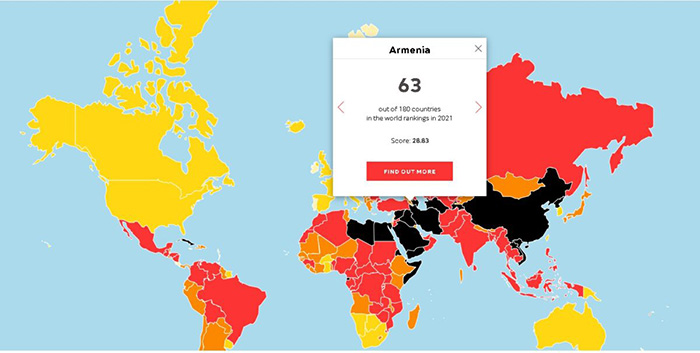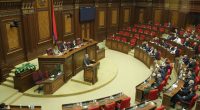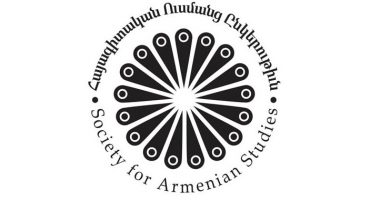This past week was marked Press Freedom Day. May 3rd is designated by the United Nations, a day to uphold the basic principles of freedom of the press, to assess the levels of freedom in different countries, and to condemn attacks on journalists throughout the world.
Since the Velvet Revolution of 2018, Armenia has made significant progress in the realm of press freedom and human rights and is ranked 63rd out of 180 countries, according to the “Reporters Without Borders” 2021 report. This position is quite telling if we consider that the United States, which has a long tradition of press freedom, ranks 44th. Several Scandinavian countries continue to be leaders in this domain.
Regardless of its ranking, the Armenian media falls short of its obligation to carry out its mission conscientiously and ethically, and fails to convey reliable information to its audience. Most of the Armenian media rely on financial support from former oligarchs for their survival. These same oligarchs are the ones who not only dictate the political orientation of the news outlet, but also put them under the obligation to spread misinformation.
The proliferation of false and misleading news is currently the main crisis facing the freedom of the press in Armenia. Often, personal posts appearing on social media immediately “jump” onto various news websites with tens of thousands of readers, giving them a much wider platform. Content with blatant misinformation or slander, even when they threaten the security of the country and promote the interests of the enemy, are widely circulated. One such example was a recent post by a well-known opposition figure, who wrote: “Stepanakert will be handed over to Azerbaijan in June.” This claim was widely circulated by websites affiliated with the former regime. In reality, the source was a “human rights activist” from Azerbaijan, who was expressing his hope for the future, and he did not even make any mention of June. Such phenomena are daily occurrences on the pages of the Armenian press and it is difficult to verify facts and to stop the spread of misinformation.
Armenia is on the verge of parliamentary elections in the coming weeks and we will witness a flurry of false information and rumors, which serve to discredit the current government, cause panic among the public, and generate favorable electoral circumstances for the opposition forces.
Currently, most of the Armenian media outlets are in the hands of opposition parties and individuals. Over the past three years, the government has not made an effort to curtail its dominance to create a somewhat level playing field for all political parties. In January, when it was time to renew the licenses of the TV networks, the application for “A1+” was denied, even though the channel was stripped of its license in 2002 by Kocharyan’s government during its crackdown on the independent media. “A1+” should have been allowed to return on air, at least to overturn the violation of its rights – something that had already been established by the European Court Of Human Rights in its ruling on this matter.
Armenian readers in the homeland and the diaspora should be extremely attentive, not only with the information that appears on social media networks, but also with the ones covered by the media – Fact checking and verifying information from multiple news outlets to ensure the validity of the news they gather.
In the face of this alarming trend in Armenian media, it is difficult to be content with the progress made in the freedom of the press. Namely when these freedoms are being utilized unethically to destroy the country’s pillars, which may one day lead to the complete loss of the achievements of the Velvet Revolution.
“MASSIS”











1 comment
I strongly feel that while elected representatives have failed us, so have too much of the mainstream news-media, including the domestic press.
Like so many other people, I have grown weary of Facebook specifically and much of general social media. The physical (and often identity) disconnect, through which the ugliest of comments can be and often are made without consequence for the aggressor, is largely at the heart of the matter. What I find indispensable about social media in general, however, is that it has enabled far greater information freedom (for example, on corporate environmental degradation and destruction) than that allowed by what had been a rigidly gatekept news and information virtual monopoly held by the pre-2000 electronic and print mainstream news-media. If not for widely accessible social media, I seriously doubt that Greta Thunberg’s pre-pandemic formidable climate change movement, for example, would’ve been able to regularly form on such a congruently colossal scale.
While I don’t know his opinion of social media, in an interview with the online National Observer (posted Feb.12, 2019) Noam Chomsky noted that while there are stories published about man-made global warming, “It’s as if … there’s a kind of a tunnel vision — the science reporters are occasionally saying ‘look, this is a catastrophe,’ but then the regular [non-environmental pro-fossil fuel] coverage simply disregards it.”